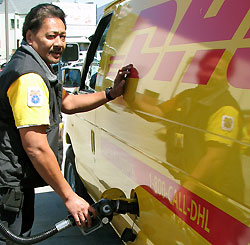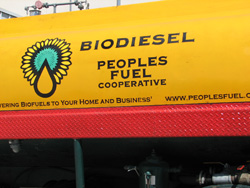Pacific Southwest, Region 9
Serving: Arizona, California, Hawaii, Nevada, Pacific Islands, Tribal Nations
San Francisco Opens First Biodiesel Fueling Station -
Trucks Running on Waste Oil from City Restaurants

Commercial fleet driver from DHL fills up with biodiesel

L to R: EPA's Waste Division Director Jeff Scott and San Francisco Mayor Gavin Newsom listen as city and commercial users tout the benefits of using biodiesel in their fleets.

The city of San Francisco was recognized by EPA for its biofuels initiative at the City's first biodiesel fueling station in the Bayview Hunters Point neighborhood. The Olympic station at 2690 Third Street supplies commercially licensed diesel vehicles with "B20" created by converting restaurant waste grease to biodiesel.
San Francisco exceeded its goal of converting 25% of the city's diesel fleet vehicles to a biodiesel blend and now has 39% of its fleet vehicles running on biodiesel. Norcal Recycling/Waste Management, the city's waste hauler, has converted 100% of their fleet to biodiesel.
B20 is a mix of 20% recycled biomass and 80% traditional diesel fuel. Unlike "B100," or 100% biofuel, most commercially sold diesel engines can run on B20 without any adjustment or adaptation.
Waste fats, oils and grease are a major source of blockages and backups in the city's sewer system. Each year, the San Francisco Public Utilities Commission (SFPUC) spends $3.5 million responding to more than 2,500 grease related blockages. Restaurants have usually paid to have their waste oil picked up by a private vendor, but the SFPUC program offers a waste oil pickup service that is free to restaurants that comply with the program standards. Collecting waste restaurant oil and grease will prevent water pollution and protect the San Francisco Bay. Recycling grease into fuel converts a waste into a commodity and protects water quality.
Replacing traditional diesel with biodiesel fuel is especially important in communities like the Bayview Hunters Point neighborhood which is heavily burdened by truck traffic on its streets. Use of biodiesel will enable the city to achieve significant reductions in very fine soot particles. These microscopic particles are one of many toxic pollutants that are emitted from diesel exhaust, which has been linked to an array of serious health problems, such as asthma and premature death. Biodiesel usage also greatly reduces carbon monoxide, hydrocarbons, toxic air pollutants, and greenhouse gas emissions.
This project is expected to reduce greenhouse gas emissions and priority air pollutants: Greenhouse gas emissions are cut in half from over 22 pounds per gallon of regular diesel to 11.5 pounds per gallon of biodiesel. Biodiesel also cuts particulate matter, the number one source for asthma in children, by almost half.
